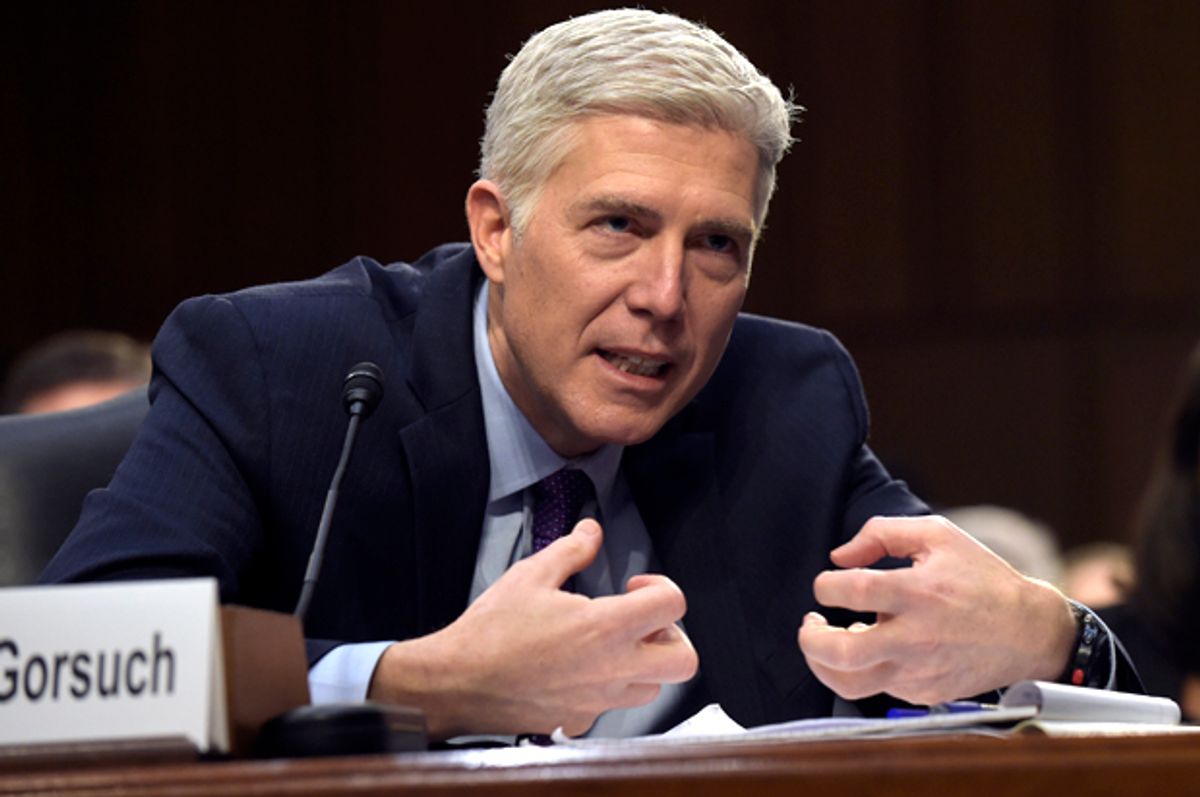The Kabuki theater that is a Supreme Court nominee's confirmation hearing continued for Neil Gorsuch on Tuesday. Democrats grilled him on his judicial philosophies and past cases. Republicans lobbed him softball questions. Gorsuch proclaimed himself shocked, shocked by the suggestion of Sen. Al Franken, D-Minn., that the court is in any way a political institution. To hear him talk, you would have thought Gorsuch was the modern incarnation of Phil Hartman’s old Unfrozen Caveman Lawyer character on “Saturday Night Live.” Senators, he all but cried, your political world frightens and confuses me.
As Franken pointed out, despite his long career as a lawyer and judge, Gorsuch is no stranger to politics. He worked on the presidential campaign of George W. Bush in 2004 and then used contacts he made through this to find a job in the Justice Department. Sen. Sheldon Whitehouse, D-R.I., noted, tartly, that a political advocacy group called Judicial Crisis Network — whose funding remains unclear — has spent $10 million on a campaign to push senators to confirm him as a Supreme Court judge.
In short, Gorsuch’s babe in the woods routine did not go over well with Democrats.
What made the whole spectacle even less palatable is the fact that Gorsuch surely knows that the Republicans' refusal to so much as hold a hearing for Merrick Garland, President Obama’s nominee for this Supreme Court seat, was about politics and not the law. It is not as if Garland was unqualified. Even Republicans thought he was qualified, before Obama had the temerity to nominate him.
Gorsuch surely heard Republican Donald Trump and Democrat Hillary Clinton using the open Supreme Court seat as a campaign issue all through the 2016 election. Surely he knows that Trump selected his name from a list of potential SCOTUS nominees compiled by the Heritage Foundation, a right-wing think tank headed by a former GOP senator who keeps scorecards on whether Republicans are reliably voting conservatively and attacks those who don’t.
All of this is to say that politics is inextricably linked to Gorsuch’s sitting at a table in a Senate hearing room as the nominee to replace the deceased Justice Antonin Scalia. In our highly polarized times, politics are the driving force for this particular nomination, much more than qualifications or perceived respect for the rule of law.
As much as Gorsuch may have tried to commit himself to Chief Justice John Roberts’ formulation that judges should, like baseball umpires, just call “balls and strikes,” Gorsuch has taken part in judging a couple of the most politically contentious cases of the last 10 years.
In 2013, Gorsuch was on the five-judge panel that heard Burwell v. Hobby Lobby Stores, a case that questioned whether an employer with sincerely held religious beliefs was required under the Affordable Care Act to provide its employees insurance coverage for contraceptive care. (The panel found in favor of Hobby Lobby Stores.) Later Gorsuch dissented from the refusal of other judges to grant an en banc rehearing in the case of Little Sisters of the Poor v. Burwell; an order of nuns had sued for the right to not sign a waiver that would grant their employees access to contraceptive care through an insurance provision outside the health care plan provided them. (The original 10th Circuit panel had ruled against the nuns.)
Pretending that Supreme Court justices are above politics, even as we ask them to rule on the most contentious political issues of the day, is a long tradition. It is one of those norms the country has struggled to hold onto, especially since the failed Supreme Court nomination of Robert Bork in 1987, still a source of partisan rancor for Republicans with long memories. This aversion to conflict has led to a leaching of all color and personality and human traits from nominees, in an attempt to force them to act like they live in a bubble that no light can penetrate.
When President Barack Obama had the opportunity to nominate a Supreme Court justice in 2009, he mentioned empathy as one of the qualities he would seek in a potential justice. This sounded like a noncontroversial requirement, and fit within the former president’s view, which he had expressed many times, that judges should be sensitive to the real-world experiences of everyday Americans and to stand up for them when other institutions have failed.
But Obama’s political opponents turned his empathy requirement into such a controversial statement that when Sonia Sotomayor went before the Senate Judiciary Committee for her Supreme Court confirmation hearings later that summer, she had to assure members that she disagreed with the president. As she told the committee, “Judges can't rely on what's in their heart," she said. "It's not the heart that compels conclusions in cases, it's the law."
But judges who have climbed to that level are not immune to the partisanship that infects other people. Pretending otherwise might be necessary for senators to get through the ritual process of holding hearings and pretending to vote on nominees based on high-minded principle. But they are not fooling anyone.

Shares